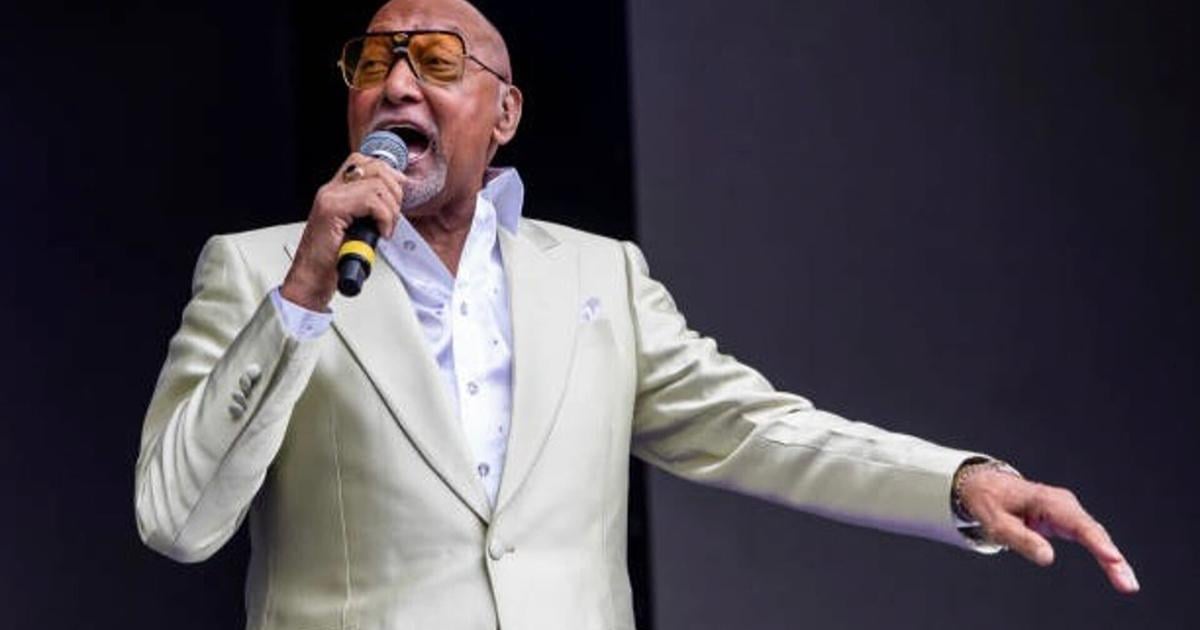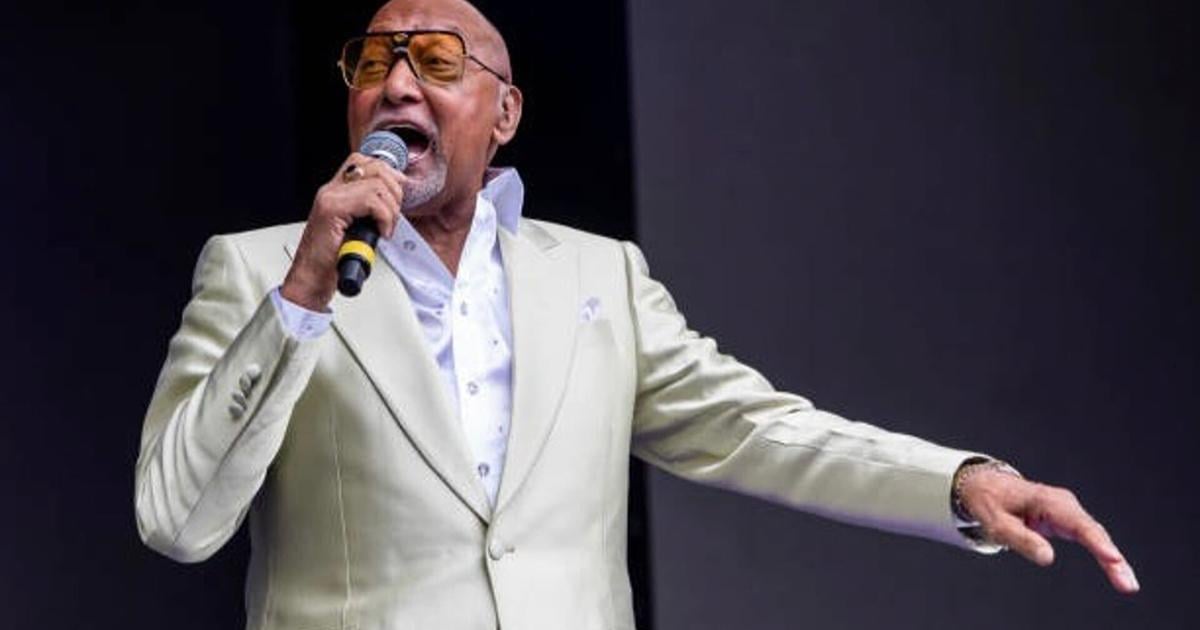ROCKMART, Ga. – Shawn Harris, a cattleman in Northwest Georgia who served in the military for 40 years and retired as a U.S. Army brigadier general, is running for the congressional seat now held by far-right U.S. Rep. Marjorie Taylor Greene (R-Ga.).
He connected with the Washington Blade last week to discuss his candidacy as a Democrat in Georgia’s deep-red 14th Congressional District — and why his promise to deliver for constituents who have been failed by their current representative is resonating with voters across the political spectrum.
“As it stands today, I’m the lead candidate on the Democratic side,” Harris said, with “three other gentlemen running against me in the primary,” but “I am the lead candidate that has already received major endorsements,” including from Marcus Flowers, another Black veteran and Democrat who ran against Greene in 2022, and VoteVets, which is backed by more than 700,000 donors/supporters.
Harris said, “This race right now is in a situation where the district’s Democrats, Republicans, and independents are actually now truly looking at Marjorie Taylor Greene and saying, ‘she has been up there for three and a half years. What has she actually done for the district?’
He said voters are telling him, “‘I hear her always screaming about, you know, impeaching somebody, but I don’t know what she has actually done for the district.’”
A couple of weeks ago, Harris noted, Greene claimed credit for bringing millions of dollars in federal infrastructure investment to her district, only to retract the statement because the money came thanks to President Biden and the Biden-Harris administration through a bill she had voted against.
“Marjorie Taylor Greene has got herself in a situation where she’s in a civil war with the Republican Party,” he said. “She hates every Democrat that walks the face of the earth, and on top of that, she doesn’t have anything that she can stand on that says what she’s actually done here inside the district — so we have a clear path to actually beat her.”
“Based on information that we received from Marcus on what went right, what he thought he could improve, and how he raised the money, we have taken everything that he did right and brought it to our team,” Harris said. “Errors that he had, we looked at it and went with a different approach — so where I’m at right now, we’re going to every zip code in Northwest Georgia; we’re not overlooking anybody.”
Harris said he has secured support from Democrats, independents, “and we have figured out how to get Republicans to also vote for me.”
Voters can relate to Harris’s life and career
“I was military and I was high-level military,” he said. “So, it’s very easy for Republicans to Google my name and look at my history. My last assignment was in Israel. So that was a very high-level position.”
“The second piece,” Harris said, “is I raise cattle. I raise Red Angus cattle. I’m actually in my office looking out the window at them right now.”
He noted that agriculture dominates Georgia’s economy, particularly “cattle and wineries,” and also said he is an active member of the Georgia Cattlemen’s Association and U.S. Cattlemen’s Association.
“Most cattlemen, at least here in this area, are Republicans,” Harris said, so during the group’s meetings, “they get a chance to meet me just as Shawn, just as another cattleman.” At the same time, he said, “they come out here and visit me on the farm” and vice-versa.
“We help each other out” with challenges on the farm, and recently Harris said he has been hearing concerns about Greene’s opposition to the Farm Bill because it includes funding for SNAP (the Supplemental Nutrition Assistance Program) even though the legislation also “covers when farmers have drought, or hurricanes or tornadoes, or like the fires that just happened out in Texas; it helps them to replace whatever they lost.”
During “this past cattlemen’s association [meeting] two days ago, we all took up money to send to the farmers out there to try to help them get back on their feet,” Harris said. “What they’re saying to me is, ‘in three and a half years, Marjorie Taylor Greene has never been to a cattlemen’s association-type meeting anywhere.’ Okay? So you think about that.”
Harris added, “I just told you that the number one industry up here in North Georgia, northwest Georgia, is agriculture. Then on top of that, it’s cattle, and she don’t even come and talk to that particular group?”
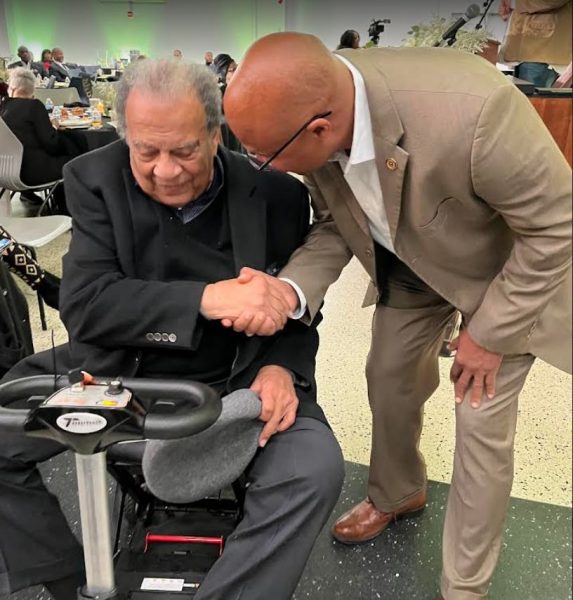
“I think she looks at it like that’s beneath her,” he said. “When you talk to cattlemen and cattlewomen, we are just everyday people, hard working everyday people, and we don’t get to sit around and watch the news and Twitter and all this kind of stuff — so in order to talk to them you’ve got to come out to their house and go out into the pasture and maybe help them with some things.”
When he visits other cattlemen and farmers, Harris said they often say, “‘you know, that guy was a general and he came over and helped you put your cow back in today.’ That is priceless. That is how you change hearts and minds.”
He hopes the experience will also “make them say, ‘OK, it’s OK to vote for Donald Trump’” but on “the second line [on the ballot] that will say Shawn Harris and Marjorie Taylor Greene,” these folks might choose to vote for the Democratic candidate or “if they skip it, the math starts going in my favor either way.”
“We have Republicans that have already come to me and are champing at the bit that are ready to start putting up signs, big signs in their pastures that will go out in mid-April that will say, ‘I’m voting for Shawn,’” Harris said.
He also discussed the significance of his military experience in the context of helping to better serve veterans in Northwest Georgia. “[We veterans are] just as diverse as everybody else,” Harris said. “And I’m going and talking to that group because I am a veteran, 100% disabled, so I know exactly what they’re going through,” particularly when it comes to challenges with getting healthcare and other services from the U.S. Department of Veterans Affairs.
“So, when I talk to my fellow brothers and sisters that are veterans,” Harris said, “I talk about those issues and say, ‘you know what? I’m going to help fix this problem, I’m going to join with Sen. [Jon] Ossoff and all of the senators to get at it, but that’s one of the things that Ossoff is really working on up here in Northwest Georgia.”
Harris said many of the policy positions outlined on his website were informed by his experience going out and talking to veterans, famers, cattlemen, teachers, and others.
“In some of the different places that we’ve been, the LGBT community has been there and asked me some questions on where I stand. And I made it very clear, just like when I was in the military, where I said ‘I believe across the board in diversity, and everybody should have a fair shake’ — that’s the same thing I believe out here northwest Georgia, and that is directly in contrast to Marjorie Taylor Greene,” he told the Blade.
Harris added that he has not yet had a formal meeting with members of the LGBTQ community, “but that community has already came to the other things and asked the question and I didn’t shy away from the question — that happened up there in Rome, Georgia.”
Asked whether, if elected, Harris might face blowback from conservative constituents over his support for LGBTQ rights, he was quick to say “no.”
“I’m not worried about any backlash or anything,” he said, because his voters “are picking me because I’m a leader,” which marks the “difference between Marjorie Taylor Greene and me — I’m going to listen to the people in my district, but I’m also going to vote and do the right thing for everybody in everybody in the district.”
Despite the efforts by Greene to “make everything seem like it’s to the extreme” including with respect to matters of LGBTQ rights, Harris said that in reality “most people out here — I don’t care if you’re Black, white, blue, or green — most people out here are laser focused on how they can get a high paying job so that they don’t have to drive to Atlanta or drive to Chattanooga, Tennessee, or drive all the way over to Huntsville, Alabama” for work.
Traveling these distances for work means “they stay over there for the week and come back on Friday,” Harris noted. “So in our area, we are breaking up the family dynamics, because either the husband or the wife is working two or three hours away from here, and so they are not here during the week.”
“What I’m trying to do,” Harris said, “and this is how I thread this needle, I’m trying to bring high-paying jobs here and generational jobs here so that people can still stay in this area, actually raise a family, and reach the American dream.”
Serving the needs of people in GA-14
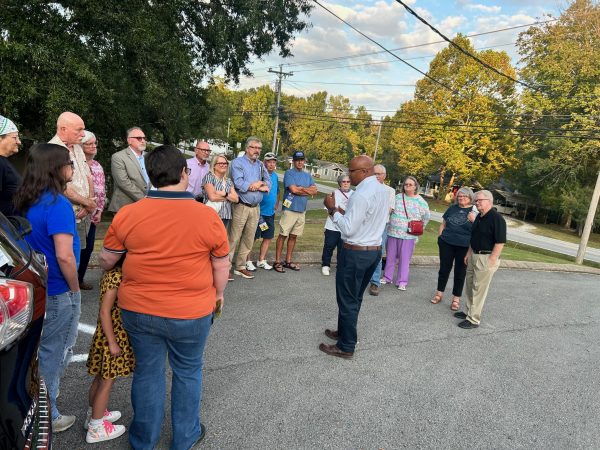
(Photo Credit: Shawn for Georgia Campaign congressional campaign)
Greene has discouraged investment in her district, Harris said, both by voting against legislation like federal infrastructure spending packages and by her extremism and refusal to work with Democrats as well as, in many cases, other Republicans.
“People are people,” he said, “and when you’re constantly out there screaming and saying negative things and saying whatever she’s saying all the time, when decision makers get a chance to make a decision, they’ve got to make whatever is the best decision for their organization. But if they say, ‘wait a minute, the person who is representing that area doesn’t seem like they want to be a team player,” then the calculus becomes, “‘where else can we take our business?’”
“What I plan to do,” Harris said, “is work very closely with the defense community and the space community and see what we can get moved from Huntsville — or whatever’s the next hot thing, to get that to be brought into the district.”
He recalled a conversation with former U.S. Sen. Richard Shelby, whom Harris was briefing in Israel, in which the Alabama Republican explained that “pretty much anything that we do in the military when it comes to defense industry or space, it all comes to Huntsville, Alabama.”
Shelby told Harris that “he wanted to make sure that in his district, no matter whether you had a GED or a Ph.D., everybody could get a high-paying job.”
“And that is what I’m trying to do for this district,” Harris said, “because we’ve got people that are already driving to these other places” to find this kind of work, so “why can’t we bring it right here? We’ve got plenty of land, plenty of space, and nothing but opportunity to make it happen — we just need the right representative to make people want to come here and do business with us.”
“I want to make sure that everybody has the same opportunities that Marjorie Taylor Greene had to have a company here, to do what they want to do with their lives,” Harris said, “and right now, Marjorie is cutting people off from opportunities.”
He added, “Her job in Washington, D.C., is to make sure that we get federal dollars into this area so that we don’t get left behind and that’s what worries me is if we continue to fight and argue, that opportunity is going to pass by our region of Georgia.”
Additionally, “Marjorie Taylor Greene is in a fight with Gov. [Brian] Kemp and that part of the Republican Party,” Harris noted. “Hence, when the state is doing certain things, we’re missing out on certain opportunities simply because Marjorie Taylor Greene is in a civil war with them.”
From the federal down to the state and the local level, the primary goal, Harris said, is “making sure we’re on the same sheet of music so that we can make things better for the people around here.”
How to beat MTG
“Marjorie Taylor Greene came in at the right time for whatever she’s trying to make herself out to be,” Harris said. “She basically came into the district — when I say came to the district, she moved from the Atlanta area into the district. And as Donald Trump was rising, she was one of the early ones that got in behind Donald Trump and rode his coattails.”
In the years since she began serving in Congress in 2021, he noted, Greene has managed to convince many rural constituents to believe what she is saying, “based on the information that she puts out here,” often through “soundbites.”
However, Harris said, often “because they have met me” or because they have moved to the area from elsewhere in the country, “people are starting to say, ‘wait a minute, what she’s telling us is not true. And we can do better.’”
“Marjorie Taylor Greene is my greatest asset,” he said. “She does something every day that actually helps me. She wants to oust the Speaker of the House for passing the budget to keep the government open. At the end of the day, here in our district, if the government shuts down — we’re not rich here, OK? We will feel it a lot faster than somebody running around New York City.”
“So, when Marjorie is saying them things, she is not even taking consideration of how this is going to affect the people in this district,” Harris said.
“Across the board, everybody is embarrassed on how she conducts herself up there in Washington, D.C., because it makes all of us down here in Northwest Georgia look like a bunch of idiots because she’s our representative,” he added.
“And if they get in behind me, and we win this thing, you would never ever have to deal with Marjorie Taylor Greene’s craziness again,” Harris said. “Because I don’t even want to repeat some of the crazy things that she has said about many communities, many communities, and that’s what gives me my energy every day to actually put things in place to actually beat her.”
The campaign, Harris said, is going to get ugly. “On social media is where I run into the Marjorie Taylor Greene people that are very bold.”
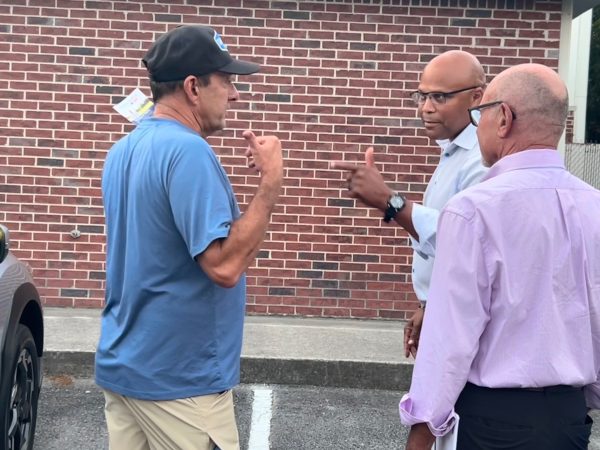
For instance, “Somebody took my picture and posted it and said, ‘hey, 90+ percent of the people that look like this guy here are the ones committing crimes.’ But guess what? Because I spent all those years in the military and I’m a leader, I did not get upset. I said, ‘you know what, OK, got it. Let’s come back positive.’ We came back positive. And the whole Twitter universe said, ‘Oh, that’s the leader that we want.’”
“I wouldn’t be running unless I thought I could win,” Harris said. Up first is Georgia’s Democratic primary election on May 21.
“In order for me — based on the people that come out to vote, based on who’s registered and all these kinds of things — the number for me to win the primary is 15,029,” Harris said, “And that gives me a 54% of the votes, so that’d be a decisive win” and position the campaign to “continue to work on more independents and more Republicans to come over to us.”
Looking ahead to the general election on Nov. 5, Harris said, “In order to beat Marjorie Taylor Greene, I need help throughout this country, because it’s going to take a lot of money to beat Marjorie Taylor Greene — and like I’ve already said, our area is not the richest part of Georgia.”
“So, in order to pull all of these things off, I’m actually appealing to the people on the ground; I’m talking to everybody face to face, going to every zip code,” he said. “But at the same time, if you go and look at me on social media, I’m on every platform out there. Every platform. So we’re fighting in the social media world and we fight face-to-face.”
“Marcus Flowers showed us, as Democrats, how to raise a lot of money into these types of races,” Harris added. “I am blessed that people are believing in me and actually want to give their hard earned dollars to our campaign and we’re being very smart and strategic about how we spend those dollars and trying to save as much as possible” because “we’ve got to get to the primary, but we try to save as much as possible so we have a war chest when we go over into the general.”
With respect to current fundraising targets, he said “we have a very good start right now.”
To win in November, however, “it’s going to take millions of dollars,” Harris noted. “So we’re constantly asking people, ‘please go to my campaign page, Shawnforgeorgia.com and donate; and if you can’t donate, just pray for us.’”
Harris pointed to Democratic Kentucky Gov. Andy Beshear’s successful reelection bid last year, after a challenging race in his “ruby red” state. “He talked about all the things that President Biden and Vice President Harris are doing with infrastructure and taking care of people — all those kinds of things, insulin, the whole nine — and he talked about those things,” Harris said. “That’s what I’m doing here.”




